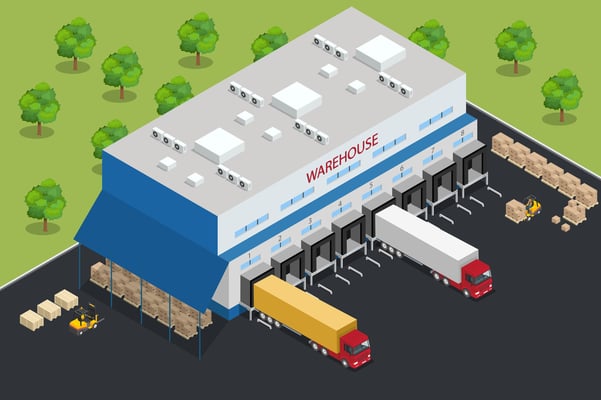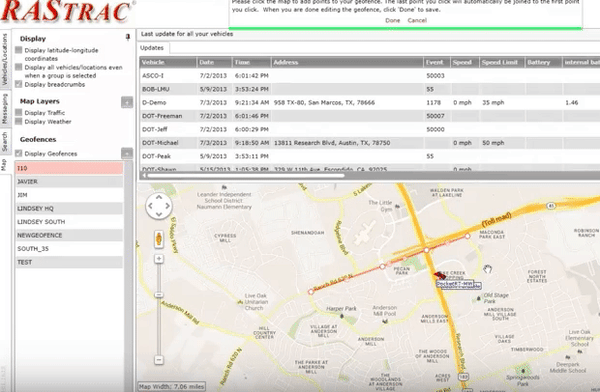Fleets with refrigerated trucks (reefer trucks) have special challenges. For example, it is vital that specific temperatures are maintained. Perishable food, including fruits, vegetables, and dairy goods, must be delivered in a timely manner, with little room for delay.

Reefers have a much higher potential for rejected loads, contract loss, insurance claims, and reputational damage. Many transportation companies are integrating their refrigeration units with fleet management GPS devices to ensure that chilled goods stay cold and safety regulations are adhered to. Following are five reasons why.
1. Equipment Failure
Equipment failure in reefers can lead to a total loss of cargo. Without other means of temperature detection, drivers have to verify temperatures during routine stops. When a refrigeration unit fails, it could go undetected for hours, much too long for many perishables.
With GPS devices, fleet managers can stay on top of the temperature and the power status of refrigeration systems. Alerts can be set up so that temperature deviations, outside of a specific range, can be sent instantaneously, and fleet managers can remotely change the refrigerator settings. Remote diagnostics also emit warnings if the power to a trailer has been disconnected.
These features allow the fleet manager to have immediate notification if something goes wrong. Refrigerated truck management and GPS tracking solutions with temperature monitoring enable fleet managers to spot a problem in minutes rather than hours. From there, fleet managers can take urgent measures to either repair the refrigeration unit or transfer the load.
2. Location Tracking
The most common use of GPS fleet tracking devices is to monitor current locations of trucks, and other assets, in the field. The route optimization features of GPS allow fleet managers to plot the most efficient routes while incorporating real-time data about traffic jams, road closures, and other driving delays. This is important for refrigerated cargo, where delivery times are very significant.
Fleet managers can, by using remote diagnostics, monitor each truck’s progress from point A to point B, note deviations from the course, and adjust routes when necessary. They are informed of how long the truck is stopped, both for pickup and delivery, and they can monitor how long the doors remain open.
3. Geofencing
Geofencing technology gives fleet managers the ability to set up virtual perimeters on a map. This allows them to automatically monitor and record the vehicle's entrance and exit of a set boundary on the map. This provides several benefits, including timely arrivals/departures and keeping drivers on task.
Timely Arrival and Departure from Work Sites
Geofencing takes the place of time cards, as fleet managers are alerted when drivers arrive at a job site and begin work. With refrigerated cargo, timing is everything.
Keeping Drivers on Task
Geofences stipulate a course for drivers that they can visit during working hours. Any deviations, from the fenced area, prompt an alert to the fleet manager detailing the distance traveled and length of time spent outside the allowed perimeter.
4. Temperature, Dehumidification, and Ventilation Tracking
With GPS tracking solutions, fleet managers can precisely set the temperature and airflow that are appropriate for their specific cargo. They can also choose temperature levels and humidity settings for various zones to match the cargo requirements. There are numerous products besides food that require climate-controlled handling, such as:
- Cosmetics, perfumes, and other personal care products
- Pharmaceuticals
- Antiques and fine art
- Tobacco products
- Chemicals and other engineered materials
5. Regulation Compliance
The Food Safety Modernization Act (FSMA) has recently published its final rule on the sanitary transportation of food. Compliance is now mandatory. The rule establishes requirements for reefers, transportation equipment, transportation operations, training, and records. The key mandates include:
- Vehicles and transportation equipment that are specifically designed and maintained for safe food transport;
- Transportation operations that establish clear food safety measures taken, such as temperature controls, and food protections from contamination from other transport loads;
- Training that instructs personnel in sanitary transportation procedures, and documentation of same; and
- Documentation of written procedures, agreements, and training
GPS tracking helps simplify regulation compliance, which is vital because the rule transfers risk and responsibility to the transportation industry. Fleet managers must be able to prove that they are following all the safety protocols, including trailer washing between loads, driver training, and maintaining temperature during transit.
Documentation must be continual on all food shipment processes, and operations, to verify that safety conditions were met every step of the way during transit. Geofencing is one example where GPS devices can help ensure that reefers are operating within compliance.
Wash bay locations can be scheduled in the working perimeter of a vehicle, and then linked to a wash ticket. Documentation can be provided electronically at a moment’s notice. Compliance provisions can be provided to shippers and receivers when requested, or on demand.
If something goes wrong, the carrier is often blamed. GPS devices, integrated with reefers, help make sure that chilled goods stay cold. They do so with properly documented, real-time recordings that automatically detail their transportation practices.







